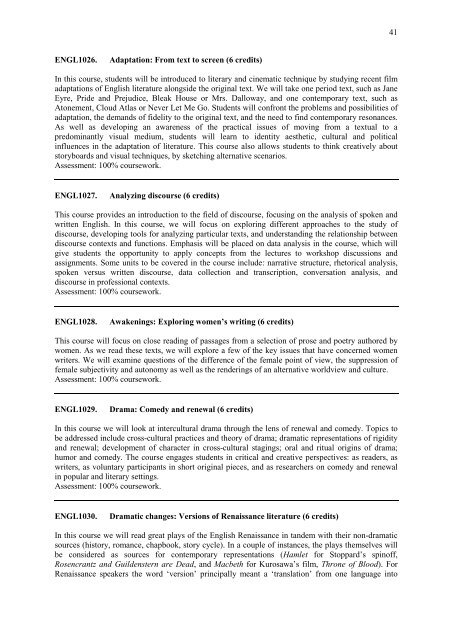(BA) (4-year-programme) - The University of Hong Kong
(BA) (4-year-programme) - The University of Hong Kong
(BA) (4-year-programme) - The University of Hong Kong
Create successful ePaper yourself
Turn your PDF publications into a flip-book with our unique Google optimized e-Paper software.
41ENGL1026.Adaptation: From text to screen (6 credits)In this course, students will be introduced to literary and cinematic technique by studying recent filmadaptations <strong>of</strong> English literature alongside the original text. We will take one period text, such as JaneEyre, Pride and Prejudice, Bleak House or Mrs. Dalloway, and one contemporary text, such asAtonement, Cloud Atlas or Never Let Me Go. Students will confront the problems and possibilities <strong>of</strong>adaptation, the demands <strong>of</strong> fidelity to the original text, and the need to find contemporary resonances.As well as developing an awareness <strong>of</strong> the practical issues <strong>of</strong> moving from a textual to apredominantly visual medium, students will learn to identity aesthetic, cultural and politicalinfluences in the adaptation <strong>of</strong> literature. This course also allows students to think creatively aboutstoryboards and visual techniques, by sketching alternative scenarios.Assessment: 100% coursework.ENGL1027.Analyzing discourse (6 credits)This course provides an introduction to the field <strong>of</strong> discourse, focusing on the analysis <strong>of</strong> spoken andwritten English. In this course, we will focus on exploring different approaches to the study <strong>of</strong>discourse, developing tools for analyzing particular texts, and understanding the relationship betweendiscourse contexts and functions. Emphasis will be placed on data analysis in the course, which willgive students the opportunity to apply concepts from the lectures to workshop discussions andassignments. Some units to be covered in the course include: narrative structure, rhetorical analysis,spoken versus written discourse, data collection and transcription, conversation analysis, anddiscourse in pr<strong>of</strong>essional contexts.Assessment: 100% coursework.ENGL1028.Awakenings: Exploring women’s writing (6 credits)This course will focus on close reading <strong>of</strong> passages from a selection <strong>of</strong> prose and poetry authored bywomen. As we read these texts, we will explore a few <strong>of</strong> the key issues that have concerned womenwriters. We will examine questions <strong>of</strong> the difference <strong>of</strong> the female point <strong>of</strong> view, the suppression <strong>of</strong>female subjectivity and autonomy as well as the renderings <strong>of</strong> an alternative worldview and culture.Assessment: 100% coursework.ENGL1029.Drama: Comedy and renewal (6 credits)In this course we will look at intercultural drama through the lens <strong>of</strong> renewal and comedy. Topics tobe addressed include cross-cultural practices and theory <strong>of</strong> drama; dramatic representations <strong>of</strong> rigidityand renewal; development <strong>of</strong> character in cross-cultural stagings; oral and ritual origins <strong>of</strong> drama;humor and comedy. <strong>The</strong> course engages students in critical and creative perspectives: as readers, aswriters, as voluntary participants in short original pieces, and as researchers on comedy and renewalin popular and literary settings.Assessment: 100% coursework.ENGL1030.Dramatic changes: Versions <strong>of</strong> Renaissance literature (6 credits)In this course we will read great plays <strong>of</strong> the English Renaissance in tandem with their non-dramaticsources (history, romance, chapbook, story cycle). In a couple <strong>of</strong> instances, the plays themselves willbe considered as sources for contemporary representations (Hamlet for Stoppard’s spin<strong>of</strong>f,Rosencrantz and Guildenstern are Dead, and Macbeth for Kurosawa’s film, Throne <strong>of</strong> Blood). ForRenaissance speakers the word ‘version’ principally meant a ‘translation’ from one language into
















